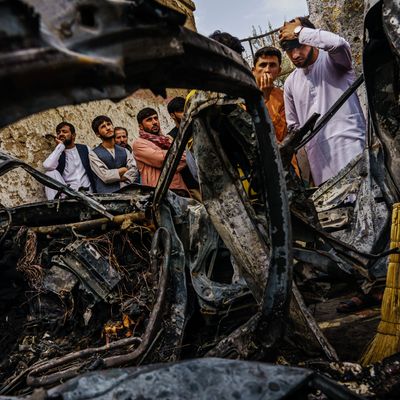
The Pentagon acknowledged on Friday that its August 29 drone strike in Kabul — which killed ten civilians, including seven children — was a “horrible mistake,” following an investigation into the air strike, which the U.S. originally claimed was a “righteous strike” on a suspected ISIS-K car bomber. The announcement came one week after in-depth investigations published by the New York Times and Washington Post revealed that the U.S. had likely mistaken an Afghan aid worker Zemari Ahmadi for a terrorist and killed him and several of his family members.
“We now know that there was no connection between Mr. Ahmadi and ISIS-Khorasan, that his activities on that day were completely harmless and not at all related to the imminent threat we believed we faced, and that Mr. Ahmadi was just as innocent a victim as were the others tragically killed. … We apologize, and we will endeavor to learn from this horrible mistake,” Defense Secretary Lloyd Austin said in a statement on Friday.
During a Friday news conference, Marine General Frank McKenzie, head of U.S. Central Command, called the strike a “tragic mistake” and said that it “was taken in the earnest belief that it would prevent an imminent threat to our forces and the evacuees at the airport, but it was a mistake and I offer my sincere apology.” McKenzie also said that the Pentagon was still assessing whether anyone would be held responsible for what happened.
Chairman of the Joint Chiefs, General Mark Milley, the Pentagon official who initially described the air strike as a “righteous strike,” also released a statement on Friday in which he said the drone strike was a “horrible tragedy of war and it’s heart wrenching,” while vowing that the U.S. is “committed to being fully transparent about this incident.”
The August 29 strike came three days after an attack by an ISIS-K suicide bomber outside Kabul’s airport, which killed nearly 200 people, including 13 U.S. service members. U.S. officials repeatedly warned over the coming days that they expected another attack to be imminent. As the Times and Post investigations showed, U.S. surveillance incorrectly identified Ahmadi, who had worked in Afghanistan for the U.S.-based aid organization Nutrition and Education International for 15 years, as an ISIS-K threat, when what had appeared to be suspicious behavior was actually just Ahmadi going about a normal day at work.
It’s also not yet clear what the U.S. will offer Ahmadi’s family beyond an apology. Amnesty International senior crisis adviser Brian Castner told the Post that the U.S. acknowledging the mistake was “not the end of their obligations.”
“They have to do their own internal investigation to figure out if any crimes were committed,” Castner added. “And there’s the obligation to families to then pay compensation afterward.”






























